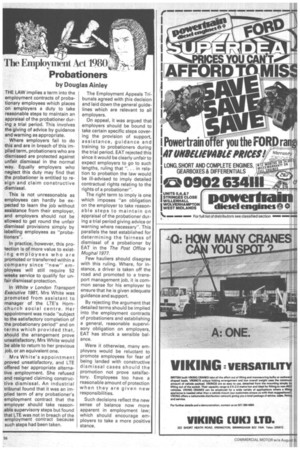Probationers
Page 46

If you've noticed an error in this article please click here to report it so we can fix it.
by Douglas Ainley
THE LAW implies a term into the employment contracts of probationary employees which places on employers a duty to take reasonable steps to maintain an appraisal of the probationer during a trial period. This involves the giving of advice by guidance and warning as appropriate.
Where employers fail to do this and are in breach of this implied term, probationers who are dismissed are protected against unfair dismissal in the normal way. Equally employers who neglect this duty may find that the probationer is entitled to resign and claim constructive dismissal.
This is not unreasonable as employees can hardly be expected to learn the job without assistance from their employer, and employers should not be allowed to get round the unfair dismissal provisions simply by labelling employees as "probationers".
In practice, however, this protection is of more value to existing employees who are promoted or transferred within a company since "new" employees will still require 52 weeks service to qualify for unfair dismissal protection.
In White v London Transport Executive 1981, Mrs White was promoted from assistant to manager of the LTE's Hornchurch social centre. Her appointment was made "subject to the satisfactory completion of the probationary period" and on terms which provided that, should the arrangement prove unsatisfactory, Mrs White would be able to return to her previous job, or an equivalent one.
Mrs White's appointment proved unsatisfactory, and LTE offered her appropriate alternative employment. She refused and resigned claiming constructive dismissal. An industrial tribunal found that it was an implied term of any probationer's employment contract that the employer should take reasonable supervisory steps but found that LTE was not in breach of the employment contract because such steps had been taken. The Employment Appeals Tribunals agreed with this decision and laid down the general guidelines which are relevant to all employers.
On appeal, it was argued that employers should be bound to take certain specific steps covering the provision of support, assistance, guidance and training to probationers during the trial period. EAT rejected this since it would be clearly unfair to expect employers to go to such lengths, ruling that ". . . in relation to probation the law would be ill-advised to imply detailed contractual rights relating to the rights of a probationer".
The right term to imply is one which imposes "an obligation on the employer to take reasonable steps to maintain on appraisal of the probationer during a trial period giving advice or warning where necessary". This parallels the test established for determining the fairness of dismissal of a probationer by EAT in the The Post Office v Mughal 1977.
Few hauliers should disagree with this ruling. Where, for instance, a driver is taken off the road and promoted to a transport management job, it is common sense for his employer to ensure that he is given adequate guidance and support.
By rejecting the argument that detailed terms should be implied into the employment contracts of probationers and establishing a general, reasonable supervisory obligation on employers, EAT has struck a sensible balance.
Were it otherwise, many employers would be reluctant to promote employees for fear of being landed with constructive dismissal cases should the promotion not prove satsifactory. Employees too have a reasonable amount of protection when they are given new responsibilities.
Such decisions reflect the new sense of balance now more apparent in employment law; which should encourage employers to take a more positive stance.














































